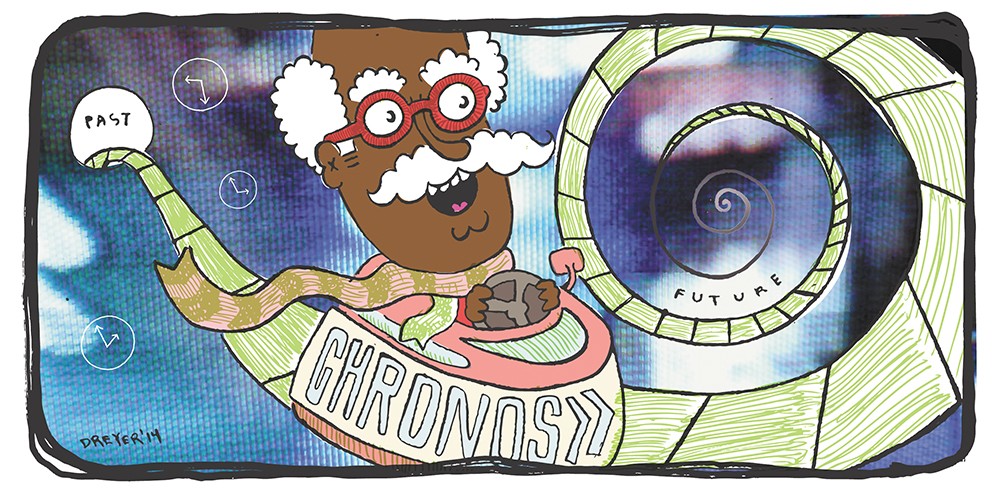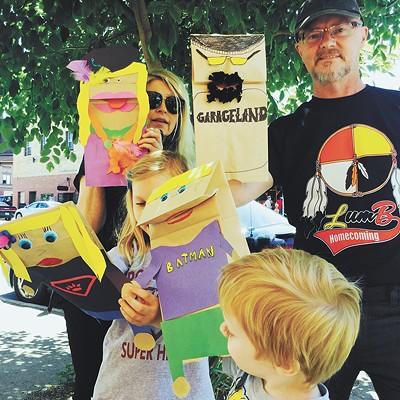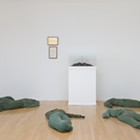"It feels like just yesterday," is supposed to be a wistful phrase, the sort uttered by a rocking-chair-bound senior, before reminiscing about the good ol' days.
But when you actually hear yourself begin to use it, it feels a lot more like horror. "Feels like just yesterday" means grappling with just how fast the sand is falling through the hourglass, and just how much has already fallen.
I've worked more than six years at the Inlander, a figure I can barely fathom. That's nearly my entire run of Crayola crayons, four-square games and spelling bees at Linwood Elementary. That's more than all the years of cafeteria banter, student body election speeches and cross-country meets at Salk Middle School and North Central High School combined. It doesn't feel a fraction of that length.
During an interview Monday, North Central Principal Steve Fisk asks in passing how long it's been since I graduated high school. A decade, I say.
"Doesn't that feel lovely," he says with a wry chuckle. Far from being a raucous celebration of 20-something youth, our high school reunion a few months ago was a small, melancholy affair, largely obsolete in the Facebook age. It would have felt like just the end of another lengthy summer vacation, if it weren't for everyone looking so old.
That goes for me too. Today, the sun burns my scalp right through my thinning hair. My metabolism no longer shrugs off binge eating as a youthful indiscretion. It's not that so much time has passed that freaks me out, it's that it feels like it's passing increasingly faster.
It's not a unique experience. I call up Tracy Walters, my grandpa who turns 84 this month. Through kids, grandkids and great-grandkids, he says his mental yardstick for measuring time keeps shifting. "We know we don't have a lot of time left," he says about himself and his friends his age. "It feels like an exponential speed-up."
If the first 22 years of life are the roller coaster slowly ratcheting up, gradually approaching the peak, the last 70 are the terrifying plunge. Then just like that, the car pulls up to the stop, and it's over.
Science, fortunately, has a diagnosis. Neuroscientist David Eagleman experiments with the perception of time at the Laboratory for Perception and Action at the Baylor College of Medicine. That extends to asking subjects to free-fall 110 feet from a gondola into a net. Afterward, they recall how long the fall took by using a stopwatch. On average, they remembered the fall lasting a third longer than it did in reality.
It's not that the perception of time slows down Matrix-style, Eagleman explains. It's that, confronted with the prospect of death, the fear response triggers the brain to copy down the information to memory in hyperspeed.
When memory recalls that experience, it has more to unspool. Eagleman convincingly argues that this discovery can be applied to perceptions of years rather than seconds. Here, the most important piece is novelty, rather than fear.
"This may be why time seems to speed up as you age: you develop more compressed representations of events, and the memories to be read out are correspondingly impoverished," Eagleman writes in "Brain Time," his 2009 essay. "When you are a child, and everything is novel, the richness of the memory gives the impression of increased time passage — for example, when looking back at the end of a childhood summer."
The brain isn't a stenographer, in other words, dutifully recording a transcript: It's a journalist, only jotting down what's important, with an eye toward what's new. Your mind measures time in column inches. Give it nothing to work with, and life speeds by like a TV listing. Cram it with strange, exciting events and it fills across reams.
Ironically, this means the much-mocked prescriptions to mid-life crises — buying a fancy car, cruising across the country on a motorcycle, having an affair — actually work. Those experiences are novel enough to slow down time.
In the long run, time doesn't fly when you're having fun, it turns out. Time flies when you're bored. It's why one year of the previous six felt longer than the other five combined: I read great books, fell in love, visited a foreign country — all novel experiences. It's why the past six months felt like they were lost between breaths. There's were no big plot twists or surprises, just repetition and routine: Deadline, sleep, coffee, deadline.
The clock-in, clock-out life, it turns out, exacts a higher cost than just wasting the seconds left on that clock: It makes those remaining seconds tick by ever faster. ♦


























